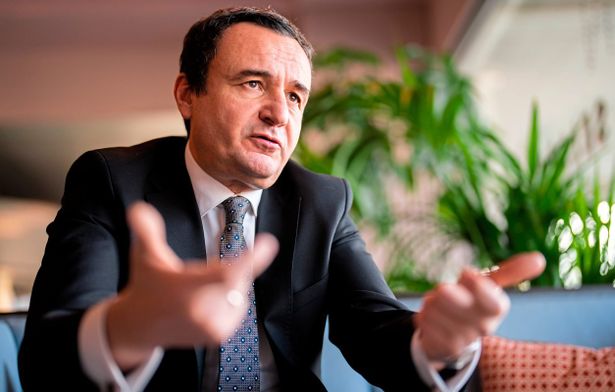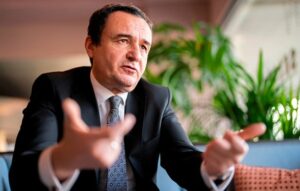Unofficial translation
Below you will find the interview translated into Albanian by Prime Minister Kurti with journalist Adelheid Wölf, conducted on January 5, 2023 and published in Der Standard on January 11, 2023.
Prime Minister of Kosovo Kurti: “Serbia has drowned the proposal for an agreement”
Serbia is not at all interested in a framework agreement with Kosovo, says the Prime Minister of Kosovo, Albin Kurti, who is visiting Vienna on Wednesday.
In December, protests and barricades by Serbs erupted in northern Kosovo following the arrest of a former Serbian police officer. The problems between the two countries date back much further: Serbia never recognized Kosovo, which declared independence in 2008. At the moment, Belgrade is not at all interested in a framework agreement with Kosovo, says Kosovar Prime Minister Albin Kurti in an interview for STANDARD.
DER STANDARD: After the crisis in northern Kosovo, there is very little trust from the Serbs living there. What will you do to build more trust in the state of Kosovo?
Prime Minister Kurti: We are not a big country, but we are a wonderful example of how economy and democracy go together. We must share this experience with our Serbs in Kosovo. I am for equal opportunity, law and order in society as a whole – no matter what ethnicity, religion, age or gender a person is. I will therefore introduce a new measure: a subsidy for employers who present a multi-ethnic and multicultural environment for workers. Private entrepreneurs will receive financial incentives if they hire minority workers.
DER STANDARD: Should the Serbs who left the Kosovo police at the beginning of November be returned?
Prime Minister Kurti: We have re-announced all the positions that have remained vacant in the police. I have no intention of replacing Serbs with Albanians. A committee will decide who will be admitted. I do not want to exclude people who have resigned themselves, but I do not call for them to return because I want others to apply as well. Those Serbs who are not members of a party should also have a chance (many Serbs in the north are controlled by the Lista Srpska party, the extended arm of the government in Belgrade, editor’s note).
DER STANDARD: When will the decision of the Constitutional Court of 2016 be implemented to return 24 hectares of land to the Serbian Orthodox Monastery of Deçan?
Prime Minister Kurti: The 24 hectares were given to the monastery during the genocidal regime of Slobodan Milosevic. However, it is a very sensitive subject and needs thorough consideration and discussion with all involved. I would like to meet the people in charge at Deçan Monastery – but so far they have refused to talk to me.
DER STANDARD: The topic is about a decision of the constitutional court, about the rule of law – not about talking to each other.
Prime Minister Kurti: There are many other court decisions that have not been implemented. I expected to talk to representatives of religious groups about theological issues and that they would be more focused on God than on material issues.
DER STANDARD: In recent months, France and Germany have initiated a new agreement between Kosovo and Serbia. When can this be implemented?
Prime Minister Kurti: On August 18 of last year, there was a groundbreaking meeting with the head of the EU’s foreign policy, Josep Borrell. First, a framework agreement between Kosovo and Serbia must be negotiated. I thought it was great. But Vucic has repeatedly said that he is not interested in such a framework agreement. He is interested in crisis management, the phenomenon of fire and firefighters. You start fires, then quickly put on another jacket and say, I can put out the fire! Three weeks after this meeting, the representatives of the French and German governments, Emmanuel Bonne and Jens Plötner, came here with ideas that I consider to be a good basis for further discussions, because they are about universal concepts and ideas about territorial integrity and sovereignty, human rights, independence and democracy. In the past there was more of a problem-solving ideology, a “sui generis” approach with an ocean of details that discouraged everyone.
DER STANDARD: And why did nothing happen then?
Prime Minister Kurti: It’s been four months since they made this proposal – and we’ve only had one high-level meeting in Brussels. We even had a tentative plan to do the deal by March or April 2023. I don’t know what happened in the meantime. The initiative and the momentum are gone. On October 27, the meeting of the Security Council of Serbia was held. Ten days later, on November 6, Serbian Foreign Minister Ivica Dacic said that in that meeting the planned agreement with Kosovo was rejected. The Serbian government apparently gave notice of this only ten days later because they still wanted to look good at the summit in Berlin on 3 November. In Berlin, we, the representatives of the six countries of the Western Balkans, signed three agreements. I am concerned that some people in the EU and the US are covering up the fact that Serbia scuttled the basic treaty proposal.
DER STANDARD: If there is a deal, what would be the most important part for you?
Prime Minister Kurti: Some of the paragraphs of the German-German agreement of 1972 are included in the proposal. But Willy Brandt went to Warsaw beforehand and apologized. And the deal was possible because the two Germanys got a seat at the UN nine months later. But with Russia and China, we have no such chance. But it is also about the fact that the five EU states that do not recognize Kosovo must also agree.
DER STANDARD: Do you see any possibility for this?
Prime Minister Kurti: The atmosphere is much more positive. But there are no concrete steps, with one exception: Greece has improved the representation of Kosovo in the country. The status of our office in Athens is for Economic Aid.
DER STANDARD: EU officials are increasingly demanding that Kosovo implement the Serbian Association of Municipalities agreed in 2013. Is there a variant you can agree to?
Prime Minister Kurti: Our constitution does not allow associations based on ethnic criteria, because the first paragraph of Ahtisaari’s plan says: Kosovo must be a multi-ethnic society. So unification can be requested along the Rugova Mountains or the Sharri mountains, but it should not be based on national identity. I also wonder why the Ahtisaari agreement should not be enough – it contains too many minority protections for Serbs. When it comes to the Serbian Association of Municipalities, I also want to refer to Bosnia-Herzegovina. On April 26, 1991, 14 Serb-majority municipalities there joined and founded an association; on January 9, 1992 they declared their independence and on February 28, 1992 they gave themselves a constitution, on December 14, 1995 this Republika Srpska was internationally recognized by the treaty in Dayton, Ohio.
Prime Minister Kurti: No, I’m not afraid. I’m only afraid of the unknown. But this is known, it has a very clear purpose.
DER STANDARD: So you exclude an association of Serbian municipalities?
Prime Minister Kurti: I told Vucic that I got the impression that he does not want the association of municipalities, because you cannot want an association of municipalities and say every week: I will not recognize the state of Kosovo. You can’t serve a coffee macchiato without a cup of coffee. But minority rights are a very important part of the full normalization of relations with Serbia. So when we get to that point, Serbia can make a proposal on how to solve it. We will also be able to make proposals on issues that we consider important for minorities in Serbia.
Now, following the plan of France and Germany, we have entered a new phase. In the plan there is a paragraph about the rights of those who do not belong to the majority. You can include it in this paragraph. And within the talks of full normalization, we can talk about that. So far, 33 agreements have been reached. There is no hierarchy here. I am interested in the implementation – for example when it comes to the border point to Zveçan, because there is an illegal road that we keep closing and reopening. Arrangements are not a buffet where you choose your favorite food. Nor are the ten articles and five sentences in the preamble of the Franco-German proposal a buffet.
DER STANDARD: Due to the pressure of the USA a few weeks ago, you had to give up trying to introduce Kosovar license plates in the north as well. What cooperation do you want with the Western powers?
Prime Minister Kurti: I cooperate very closely with the USA, Germany, France, Italy, Great Britain, the EU and NATO. We have much more sympathy and cooperation with the current US administration than with the previous one. Since the end of September 2021, MiG-29 took off on our border and Serbian troops came to the border, the situation has changed. I can argue with Serbia, but when the Russian ambassador to Serbia, Alexander Bocan-Kharchenko, comes with a MiG-29, that’s something else. This is why I would like to see more NATO soldiers here in Kosovo.
DER STANDARD: Did anyone take their side when Aleksandar Vučić recently called you “terrorist scum”?
Prime Minister Kurti: In general, I do not feel that I am treated the same. The West has some fear of Serbia’s destabilizing potential – and on the other hand, there is the naivety to think that Serbia could be forced back into the West any time soon. Therefore, the six countries of the Western Balkans are falling into a pit, the edges of which are currently low expectations of Vucic now, but high expectations for later. Therefore, any positive action Vucic takes is inflated.
DER STANDARD: Is it certain that Kosovo will be without Schengen visas until 2024 and is there enough support for membership in the Council of Europe?
Prime Minister Kurti: Yes, visa-free travel will come in 2024. And we have support for membership in the Council of Europe. But we still have to go through some procedures. We will also apply for NATO membership.



